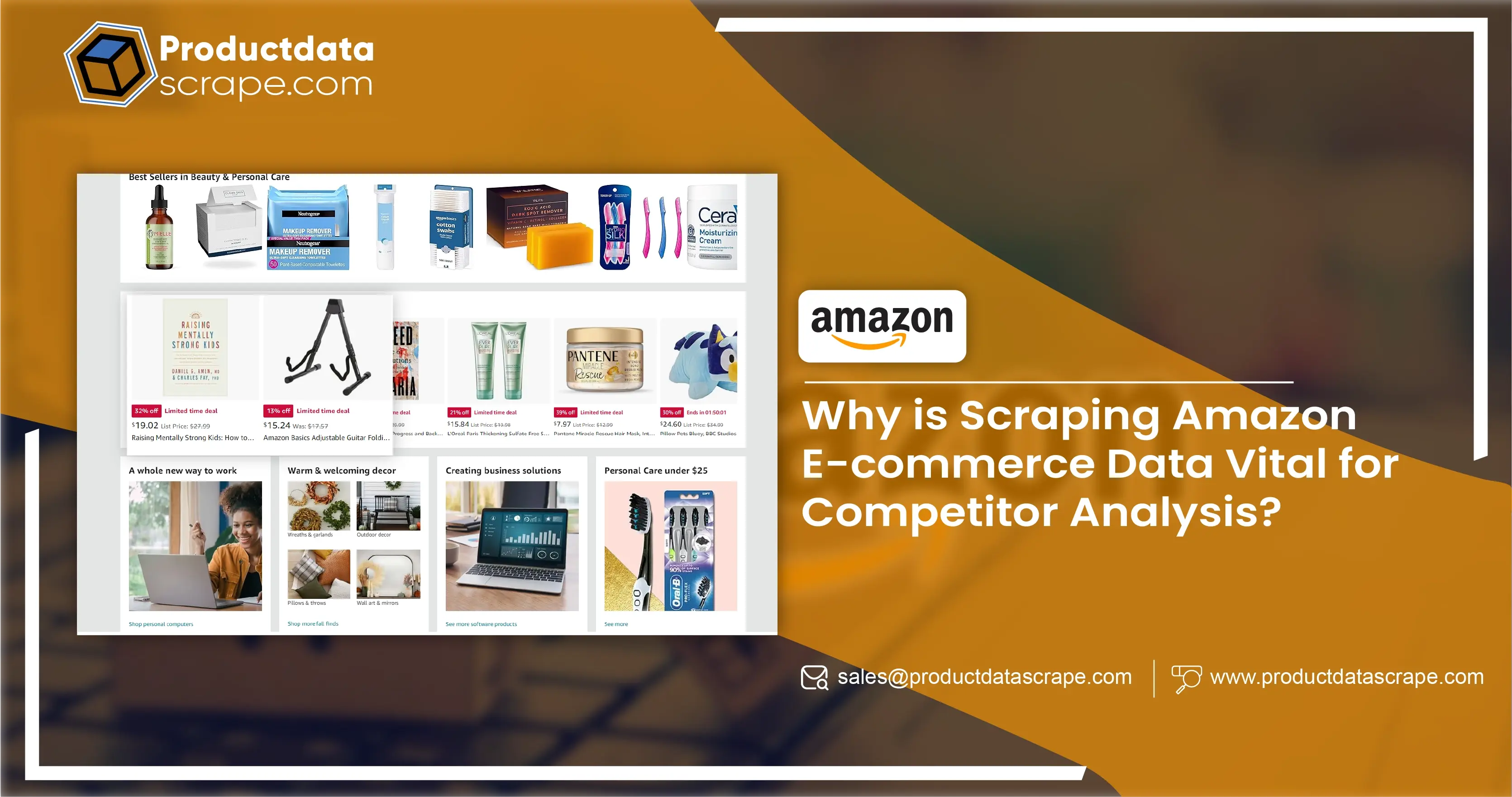 Launch apps instantly. Claim $200 credits on DigitalOcean
Launch apps instantly. Claim $200 credits on DigitalOcean
Why is Scraping Amazon E-commerce Data Vital for Competitor Analysis?
Written by productdatascrape » Updated on: April 04th, 2024

Why is Scraping Amazon E-commerce Data Vital for Competitor Analysis-01
In the e-commerce realm, data reigns supreme as a currency of value. Accessing and scrutinizing pertinent data can mean the disparity between business success and stagnation. With Amazon reigning as the paramount online marketplace globally, it possesses abundant, invaluable information awaiting extraction. By leveraging the technique of e-commerce data scraping, businesses can unlock this treasure trove to glean insights, refine strategies, and maintain a competitive edge. Scraping Amazon e-commerce data allows for the automated collection of product details, pricing trends, customer reviews, and market dynamics from Amazon's vast platform. By dissecting this wealth of e-commerce data, companies can decipher consumer preferences, pinpoint market trends, and adjust their offerings and strategies accordingly. In essence, e-commerce data scraping from Amazon is a pivotal tool in empowering businesses to navigate the complexities of the digital marketplace with precision and agility.
Significance of Scraping Amazon E-commerce Data
Significance of Scraping Amazon E-commerce Data-01
Amazon's e-commerce platform is a treasure trove of valuable data that holds immense significance for businesses across various domains. Through e-commerce data scraping from Amazon, companies can tap into a wealth of information spanning product catalogs, customer reviews, pricing dynamics, and marketplace trends. Here's a more detailed exploration of the significance of scraping Amazon's e-commerce data:
Comprehensive Market Research and Competitor Analysis: E-commerce data scraping services enable businesses to monitor competitors' activities on Amazon closely. By analyzing competitors' product offerings, pricing strategies, customer reviews, and market positioning, companies gain valuable insights for benchmarking and refining their strategies. This competitive intelligence helps identify market gaps, understand consumer preferences, and optimize marketing efforts to gain a competitive edge.
Dynamic Pricing Optimization: Pricing optimization is critical for success in the fiercely competitive e-commerce landscape. By scraping Amazon's pricing data, businesses can monitor price fluctuations, analyze pricing trends, and identify opportunities for dynamic pricing adjustments. Companies can maintain competitiveness while maximizing profitability by optimizing pricing strategies based on real-time data insights.
Strategic Product Catalog Expansion: Analyzing Amazon's extensive catalog provides businesses invaluable insights into emerging trends, popular product categories, and niche markets. By scraping and analyzing product data, companies can identify lucrative opportunities for product expansion or diversification. This data-driven approach enables businesses to align their offerings with evolving consumer preferences, capitalize on market trends, and stay ahead of competitors.
In-depth Customer Sentiment Analysis: Customer reviews on Amazon serve as a rich source of qualitative data, offering insights into product performance, customer satisfaction levels, and pain points. Through e-commerce data extraction, businesses can extract and analyze customer reviews at scale. This analysis enables companies to gauge sentiment, identify common themes or issues, and pinpoint areas for product improvement. By leveraging customer feedback effectively, businesses can enhance product offerings, address customer concerns, and tailor marketing strategies to resonate with target audiences.
Trend Forecasting and Decision Making: Beyond immediate insights, scraping Amazon's e-commerce data empowers businesses to forecast market trends and make informed strategic decisions. By continuously monitoring marketplace dynamics, tracking consumer behavior, and analyzing historical data trends, companies can anticipate shifts in demand, identify emerging opportunities, and adapt their business strategies proactively.
Scraping Amazon's e-commerce data offers businesses a competitive advantage by providing access to real-time insights, enabling data-driven decision-making, and fostering innovation in product offerings and marketing strategies. By harnessing the power of e-commerce data scraping services, companies can navigate the complexities of the digital marketplace with agility and precision, driving growth and staying ahead of the curve.
Role of Amazon E-commerce Data Extraction Expert
Role of Amazon E-commerce Data Extraction Expert-01
The role of an Amazon e-commerce data extraction expert is pivotal in navigating the vast ocean of information available on the platform. With Amazon being one of the largest online retailers globally, the expert is tasked with extracting, analyzing, and interpreting data to provide valuable business insights. They utilize various tools and techniques to scrape data from product listings, customer reviews, pricing trends, and sales figures. By harnessing this data, they uncover market trends, competitor strategies, and consumer preferences, enabling businesses to make informed decisions.
These experts deeply understand web scraping technologies, data manipulation, and analysis. They develop custom scripts or utilize specialized software to efficiently extract data while adhering to Amazon's policies and regulations. Moreover, they are proficient in data cleaning and normalization techniques to ensure accuracy and consistency in the extracted data.
The insights provided by Amazon e-commerce data extraction experts are instrumental in optimizing product listings, pricing strategies, and marketing campaigns. They help businesses identify growth opportunities, optimize inventory management, and enhance customer satisfaction. In a rapidly evolving e-commerce landscape, their role is indispensable for businesses striving to stay competitive and relevant in the digital marketplace.
Legal and Ethical Consideration for Scraping Amazon E-Commerce Data
Legal and Ethical Consideration for Scraping Amazon E-Commerce Data-01
While the benefits of web scraping Amazon data are undeniable, businesses must navigate this practice's legal and ethical complexities. Like many online platforms, Amazon has strict terms of service that explicitly prohibit automated data scraping. Failure to comply with these terms can lead to serious legal consequences, including receiving cease and desist orders or facing legal action.
Businesses must adhere to a set of ethical scraping practices to mitigate the risks of legal repercussions:
Respecting Robots.txt: Before initiating any scraping activities on Amazon, it is imperative to review the website's robots.txt file. This file outlines which sections of the site are off-limits for scraping. Adhering to these directives is essential to avoid attracting unwanted attention and potential penalties.
Using Proper Identification: When conducting scraping operations, it's vital to ensure that the bot identifies itself accurately through user-agent headers. It lets website administrators differentiate between legitimate and potentially malicious bots, fostering transparency and trust.
Avoiding Server Overload: Implementing rate-limiting measures is crucial to prevent excessive server requests that could strain Amazon's servers and disrupt its services. Businesses can maintain a respectful and non-disruptive scraping operation by regulating the frequency and volume of scraping requests.
Monitoring Terms of Service Changes: Businesses must stay vigilant about any updates or alterations to Amazon's terms of service concerning web scraping. By regularly monitoring these changes, organizations can adapt their scraping practices to ensure ongoing compliance.
While e-commerce data scraper offers immense potential for gathering valuable data insights, it must be conducted responsibly and ethically. By adhering to these best practices and remaining vigilant about legal and ethical considerations, businesses can harness the power of web scraping while minimizing the associated risks.
Tools and Techniques for Scraping Amazon E-commerce Data
Tools and Techniques for Scraping Amazon E-commerce Data-01
Custom Web Scraping Scripts: Develop custom scripts using programming languages like Python and libraries like Beautiful Soup or Scrapy. These scripts can extract specific data elements from Amazon's web pages, providing flexibility and customization options.
Web Scraping Services: Utilize third-party web scraping services or APIs specifically designed for extracting data from e-commerce platforms like Amazon. These services often offer user-friendly interfaces and comprehensive data extraction capabilities.
Browser Extensions: Install browser extensions like DataMiner, Web Scraper, or ParseHub. These tools allow users to scrape data directly from web pages using a point-and-click interface, making them ideal for users without programming expertise.
Proxy Servers: Employ proxy servers to mask the IP address of scraping bots, preventing Amazon from detecting and blocking scraping activities. Rotating proxies helps distribute requests across multiple IP addresses, reducing the risk of detection.
Practical Applications of Scraped Amazon E-commerce Data
Practical Applications of Scraped Amazon E-commerce Data-01
Once Amazon's e-commerce data is successfully scraped, businesses can leverage it for various applications:
Competitive Intelligence: Analyze competitors' product offerings, pricing strategies, and customer reviews to refine marketing tactics and enhance product positioning.
Price Monitoring and Optimization: Track pricing dynamics, identify trends, and adjust pricing strategies in real time to maintain competitiveness and maximize profitability.
Market Trend Analysis: Identify emerging trends, popular product categories, and seasonal fluctuations to inform inventory management and marketing campaigns.
Customer Sentiment Analysis: Analyze customer reviews and feedback to understand sentiment, address product issues, and improve overall customer satisfaction.
Conclusion: Scraping Amazon e-commerce data empowers businesses with actionable insights, enabling them to make informed decisions, optimize strategies, and gain a competitive edge in the dynamic e-commerce landscape. While navigating legal and ethical considerations is paramount, leveraging the wealth of data available on Amazon can unlock many opportunities for growth and success.
At Product Data Scrape, ethical principles are central to our operations. Whether it's Competitor Price Monitoring or Mobile App Data Scraping, transparency and integrity define our approach. With offices spanning multiple locations, we offer customized solutions, striving to surpass client expectations and foster success in data analytics.
Know More:
https://www.productdatascrape.com/scraping-amazon-e-commerce-data-vital-for-competitor-analysis.php
ScrapingAmazonEcommerceData,
ScrapingAmazonPricingData,
AmazonEcommerceDataExtraction,
ScrapeAmazonProductData,
EcommerceDataScraping,
Copyright © 2024 IndiBlogHub.com Hosted on Digital Ocean









Post a Comment
To leave a comment, please Login or Register